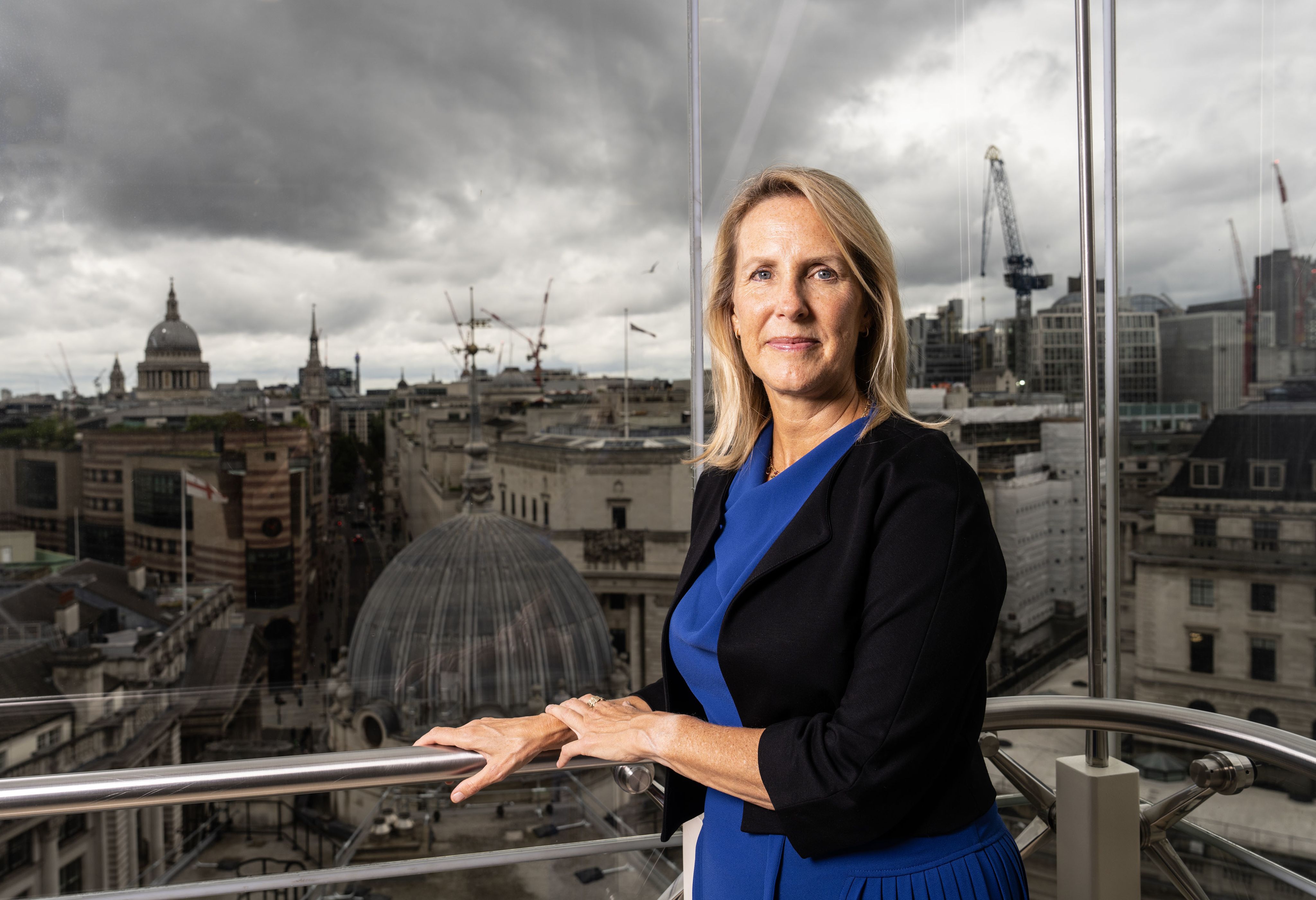
In for the
long haul

Pension Insurance Corporation CEO, winner of this year’s Veuve Clicquot Bold Woman Award and member of the new British infrastructure council, Tracy Blackwell talks to Lysanne Currie about regulation, workplace culture and pensions with a personal touch
For Tracy Blackwell, winning this year’s prestigious Veuve Clicquot Bold Woman Award, a prize honouring courageous female businesswomen, wasn’t just a moment of personal triumph. It sent out a message she would like to see hollered from the rooftops: “Finance is fascinating!”
The co-founder and CEO of Pension Insurance Corporation (PIC), Blackwell was honoured for growing it into a FTSE 100-sized business that pays the pensions of 350,000 people. Established in 2006, the specialist insurance company has expanded its asset portfolio to £50bn, of which more than £13bn is invested in UK infrastructure, including the UK’s largest urban regeneration project, sited in the Wirral.
And yet, as she said from the stage of the Royal Opera House, “The pensions industry flies beneath the radar much of the time.” And indeed, in 52 years of the Bold Woman Award, she is only the third winner from the financial services sector. “Finance isn’t as sexy as tech,” she says. “But it does have an incredibly important purpose.”
“Finance isn’t as sexy as tech but it does have an incredibly important purpose”
It’s fair to say Blackwell has been obsessed with finance since she was a teenager, becoming what must have been one of the Wall Street Journal’s youngest readers. Still, she admits she’s slightly bemused at her own career trajectory: “How did I get here? That is such a good question. As I say to everybody who asks for advice, you can plan all sorts of things, but nothing ever comes out the way you think it’s going to. You just have to go with it.”
Receiving the 2024 Veuve Clicquot Bold Woman Award from newsreader Naga Munchetty
Receiving the 2024 Veuve Clicquot Bold Woman Award from newsreader Naga Munchetty
Culture club
The American-born Blackwell’s journey began during the challenging job market of the 1990-91 recession, which led her to join an international work-exchange programme before pursuing an MBA. Her tenacity eventually landed her a position at Goldman Sachs in 1993, where she honed her financial acumen for a decade.
“I’d never get into Goldman now,” says this daughter of a teenage single mum. “I didn’t have the right university. I didn’t have the right anything. But those were different days.” While she valued it as a great training ground, she quit Goldman Sachs, feeling its workplace culture wasn’t what she wanted. “The way it worked didn’t suit me,” she says. “To be honest, I don’t think my values suited their values.”
In 2006, she reunited with a handful of former colleagues to co-found PIC, funded from the outset with strong investor backing and aimed at revolutionising pension management. “We were like refugees from big organisations that just wanted to create something different,” she recalls. “We set about creating a culture more akin to what we wanted.”
And yet, they’d still need to operate within a broader, often cut-throat external culture. So how did they do it? By creating a strong internal culture, she says – and being meticulous about hiring. “It’s really about making sure you have the right fit,” she says. “That’s the bullseye.”
“Working in finance is the opposite of a wasted career. It’s actually incredibly important and meaningful”
However, as the company grew, they had to make “incredibly painful decisions” to change personnel: “The people you have when you’re starting a company are not the same people you need when you’re running a big company. They’ve been great along the way and were great at what they did – but they’re just the wrong people for the next stage.”
The new firm’s main challenge was gaining trust in a “very conservative industry”. This they addressed by delivering exceptional customer service. Part of this lies in their direct approach.
“Some eight or nine years ago, we started a project to remind people why the finance industry exists, working with academics and the London Stock Exchange to figure this out,” she says. “There was no academic research about what the finance industry was for, which is quite extraordinary.”
And so, at PIC, employees actually meet their customers, “which, in finance, is very, very unusual. We have policyholder days, where our policyholders come and meet the management, and they learn about how we’re looking after their money.”
PIC stands out in other ways, too: unlike many listed companies, focused on short-term goals, this private company can invest for the long term. She laments short tenures for CEOs leading to short-term thinking – which is especially problematic for financial sustainability. Many pension funds and asset managers also focus on short-term results due to frequent performance measurements. Rewarding asset owners for long-term results would encourage sustainable finance.
Blackwell argues that private equity firms and endowments, which don’t need quick pay-outs, demonstrate the success of long-term investment strategies. If asset-owners were rewarded for long-term results, “you’d start getting long-term behaviour”, she says.
Home run
We now have a new government, but the UK faces major economic and investment challenges. Blackwell cites an urgent need for investment, estimating that of the £600bn expected to pass from pension funds to insurers over the next decade, £200bn would ideally be invested in the UK economy. However, current planning regulations and a general lack of economic ambition are stifling opportunities. “And tweaking some planning rules isn’t going to fix it,” she says.
“The Chancellor’s focus on economic growth is absolutely right,” she adds. “We now have political recognition that the means to achieving economic growth is to make our towns and cities denser and more connected, and therefore more productive. I think this ambition is a key part of making Britain investible again.”
Blackwell points out that the lengthy approval process in the UK, which takes up to three years, compared with six months elsewhere, discourages investment, which tends to flow where it encounters the fewest barriers. She cites an example from Clarkson’s Farm in which opening a simple cafe required navigating pages and pages of agencies for permissions.
“And that is what is slowing everything down,” she says. “It takes a matter of minutes to set up a company in this country. But in order to get that company up and running, it could take weeks, months, years…” She highlights a film studio project in Marlow, backed by the likes of James Cameron, Paul Greengrass and Richard Curtis, that faced 28 months of planning delays. In late May, it was refused planning permission, potentially deterring international investment – despite the involvement of “some of the biggest directors on the planet. It’s suffocating, it’s crazy, and it has to change.”
As chair of the Business Advisory Council of the Regulatory Reform Group, she also worries that too much government power has been handed to independent bodies, which control some 40% of government revenues. This includes the dozens of arm’s-length bodies that proliferate with little oversight, real management or coordination across the economy; for example, Natural England, which has managed to prevent more than 150,000 homes being built over recent years, as it focuses exclusively on its “nutrient neutrality” mandate.
Perhaps her presence on new Chancellor Rachel Reeves’s British infrastructure council will help to move things in the right direction. “The more it’s discussed, the more chance there is that something will change,” she says. But for Blackwell, accountability remains the biggest problem. “Some 40% of our revenues, our tax money, is being spent by bodies which literally have no accountability. People really need to wake up and figure that one out.”
Education
Studied finance at University of Illinois-Urbana-Champaign and Gies College of Business, earning an MBA
1993
Joins Goldman Sachs Asset Management, rising to Head of Risk Management, EMEA
2006
Co-founds Pension Insurance Corporation, taking role as Chief Investment Officer; made Director in 2011, then promoted to CEO in 2017
2013
Appointed NED at United Trust Bank Ltd
2017
Joins advisory council of diversity project, Investment Industry; becomes trustee at Elton John Aids Foundation
2019
Joins the Wellcome Trust Investment Committee
2020
Appointed to Association of British Insurers board

Education
Studied finance at University of Illinois-Urbana-Champaign and Gies College of Business, earning an MBA
1993
Joins Goldman Sachs Asset Management, rising to Head of Risk Management, EMEA
2006
Co-founds Pension Insurance Corporation, taking role as Chief Investment Officer; made Director in 2011, then promoted to CEO in 2017
2013
Appointed NED at United Trust Bank Ltd
2017
Joins advisory council of diversity project, Investment Industry; becomes trustee at Elton John Aids Foundation
2019
Joins the Wellcome Trust Investment Committee
2020
Appointed to Association of British Insurers board
Tracy Blackwell with Francesca Brady, winner of the Bold Futures Award
Tracy Blackwell with Francesca Brady, winner of the Bold Futures Award
Still, some positives. As Blackwell stated in her acceptance speech, winning the Veuve Clicquot Bold Woman Award “will help to raise the profile of this crucial industry… I hope I can inspire the next generation of game-changing, bold female entrepreneurs.” And for her, it’s crucial for women to see and understand that working in finance, a male-dominated industry, “is the opposite of a wasted career. It’s actually incredibly important and meaningful.”
Nevertheless, she also acknowledges the ongoing challenges in achieving diversity, inclusion and a healthy culture within the sector: “It all starts from purpose. If that flows through your organisation, you’ll have the right culture. The purpose isn’t to make a lot of money. It’s to do something important for society.”
For women in business especially, she says: “If you believe you can do something, you can do it… But be yourself. So many women try to be something they’re not. And it doesn’t serve them very well. You have to be yourself. It really works.”
For more resources, visit the ICAS pensions hub









